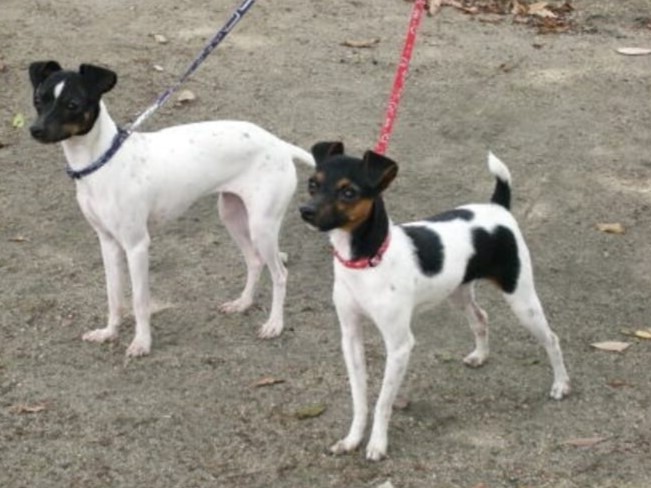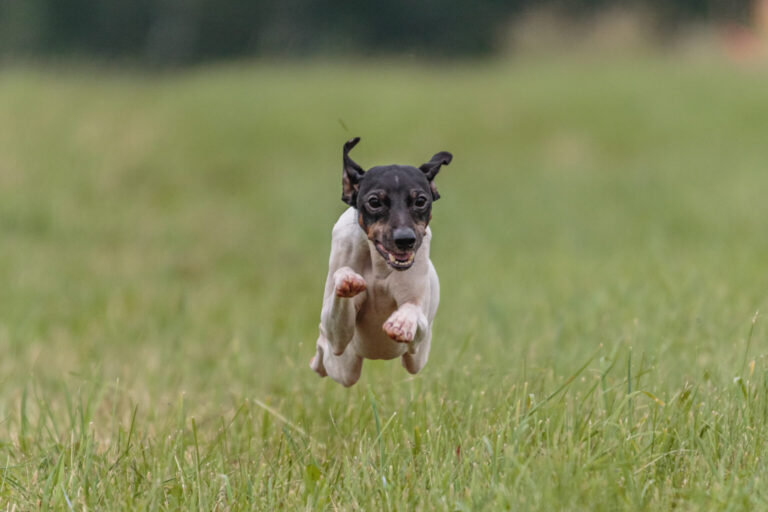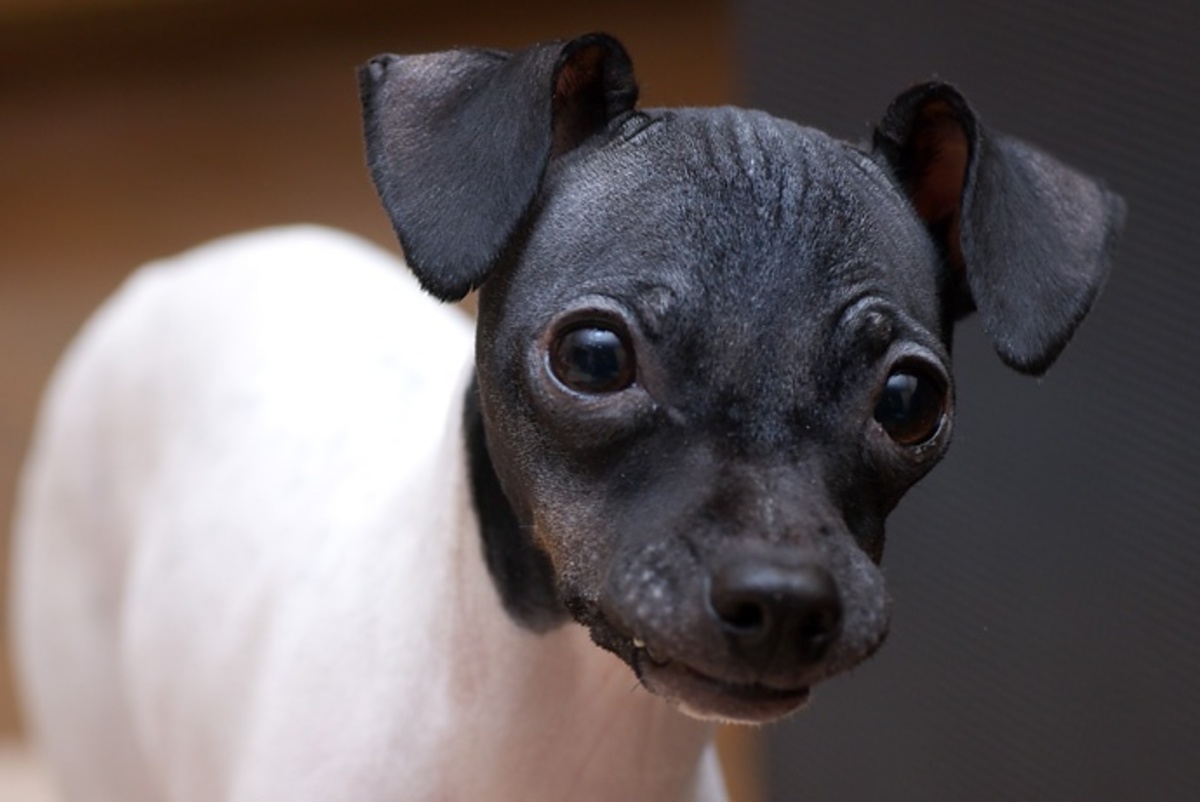Japanese Terrier Dog Breed

| Feature | Details |
|---|---|
| Origin | Japan |
| Birth Era | 1930s |
| Crossbreed | Smooth Fox Terrier × Native Japanese Dogs |
| Temperament | Energetic, sociable, strong family attachment |
| Physique | Height 30-33 cm, Weight 5-6 kg |
| Coat | Short, white with black/tan markings |
| Lifespan | Average 12-15 years |
The Japanese Terrier, originating in early 20th-century Japan, is an amiable small dog, a result of breeding with the Smooth Fox Terrier.
They are both lively and sociable, with high intelligence that makes them easily trainable, and they feature a low-maintenance short coat.
Suited for urban living, they have an average lifespan of 12-15 years and generally do not have health issues, though genetic awareness is important.
Enthusiasts domestically and abroad keep them, and they utilize their traits at home and in exhibitions.
Coat Color
The Japanese Terrier’s pristine white coat with black and tan markings is as distinctive as the strokes of traditional Japanese calligraphy, adding a unique charm to their expression. The tan markings at the base of the ears and above the eyes enhance their vivid expressions and are seen in Japan as a reflection of their spirited nature. The well-balanced tri-color pattern serves as a clear identifier for the Japanese Terrier, contributing to its popularity both within and outside Japan.
In Japan, there is a cultural reverence for the aesthetic of harmonious contrasts, which is mirrored in the appreciation for the Japanese Terrier’s coat pattern. It’s an embodiment of beauty in balance, much like many aspects of traditional Japanese art and design.
Coat Type

The Japanese Terrier’s short, smooth double coat is well-adapted to the hot summers of Japan. However, as the cold of winter can be quite challenging for them, in Japan, it is common practice to attentively adjust the care for our beloved dogs with the changing seasons. During the colder months, it is advisable to keep them warm with measures such as clothing, reflecting a proactive approach to pet health care.
This attentiveness to seasonal needs not only demonstrates the care and consideration Japanese pet owners have for their dogs but also aligns with the broader cultural emphasis on harmony with nature and adaptation to environmental changes.
Size
The Japanese Terrier is a charming small breed native to Japan, with a height ranging from about 12 to 16 inches, known for its slender build. Their compact size makes them an ideal fit for limited living spaces, which is why they are so beloved in Japanese households. However, their delicacy as a small breed also means that there is a well-understood need for extra care against low temperatures and injuries in Japan.
In Japan, there is a cultural appreciation for meticulous care and attention to detail, which extends to how pets are treated, ensuring that even the smallest breeds like the Japanese Terrier are provided with an environment that caters to their specific needs.
Weight

The Japanese Terrier, typically weighing around 11 pounds, is a small breed where weight management is given significant attention in Japan. Individual variations necessitate a tailored approach to diet and exercise to maintain a standard physique and health. Given that obesity can lead to joint and organ issues, maintaining a healthy weight is strongly advocated in Japanese pet care practices.
This emphasis on health reflects the broader Japanese principle of balance and moderation in all aspects of life, including the care we provide to our pets.
Lifespan
The Japanese Terrier is said to have an average lifespan of 12 to 14 years, a figure derived from a relatively small population sample. In Japan, there’s a cultural emphasis on cherishing the preciousness of each life, and it is hoped that every dog lives a long and healthy life. This respect for the “average lifespan” is a reflection of our wish for each individual canine to thrive for as long as possible.
In the context of Japan, this perspective underscores a reverence for life and well-being that extends to our pet companions, hoping that they accompany us for many fulfilling years.
Trainavility

The Japanese Terrier is renowned for its intelligence and ease of training, responding swiftly and eagerly to commands. In Japan, there is a significant emphasis on positive reinforcement in dog training, cultivating breeds with strong independence through patience and consistent guidance. It’s customary to provide a variety of social experiences from puppyhood, training them to adapt flexibly to numerous situations and people.
This approach in Japan reflects the broader cultural values of persistence and harmony, encouraging a bond between owner and pet that is built on mutual respect and understanding.
Exercise
The vivacious Japanese Terrier requires ample exercise for its wellbeing. In Japan, a thoughtful approach to pet care is esteemed, which includes ensuring pets get around 30 minutes of vigorous exercise during daily walks. Depending on the season, it’s advisable to walk them during the cool early mornings or evenings in summer and the warmer midday in winter. In severe cold, indoor play is preferred to safeguard their joints, with activities on softer surfaces like carpets or mats being optimal.
Such practices underscore the Japanese philosophy of mindful and adaptive pet care, which values the protection and health of animals throughout the changing seasons.
Feeding

The vivacious Japanese Terrier thrives on a diet that mirrors the Japanese philosophy of balanced nutrition, with high-quality proteins and just the right amount of fats.
Selecting dog food made from natural ingredients and minimal chemical additives is a priority for pet owners in Japan.
Attention to potential food allergies and controlling portion sizes to prevent obesity are foundational to canine health management shared among Japanese dog lovers.
Dividing meals throughout the day to boost metabolism and maintain stable energy levels is also a cherished practice in Japanese pet care.
Fresh water availability at all times is another staple.
Even when living in the United States, adhering to these principles of health maintenance is crucial for the well-being of your beloved dog.
Temperament

The Japanese Terrier exhibits a profound attachment to its family while maintaining a cautious demeanor towards strangers and other animals. This aligns with the traditional Japanese perspective on dogs, which values a balance of loyalty and vigilance. Known for its quiet nature, the Japanese Terrier rarely barks without cause. However, it stands ready to fulfill its role as a watchdog, alerting its owner to any unusual noises. The breed is also intelligent, attuned to the emotional state of its owner; it respectfully keeps its distance when the owner is busy and seeks affection when it detects a moment of relaxation.
In Japan, this behavior of discerning when to interact with its owner is admired, reflecting a cultural appreciation for understanding and adapting to one’s surroundings. The Japanese Terrier, thus, is not just a pet but a reflection of valued societal traits.
History
The Japanese Terrier originated in the 1700s in Nagasaki, born from a cross between the foreign Smooth Fox Terrier and native Japanese small breeds. Entering the Showa era, it gained popularity as a lap dog, especially in Kobe, where it was affectionately known as the “Kobe Terrier.” With the outbreak of the Pacific War, its numbers dwindled drastically. Faced with potential extinction, the dedication of Japanese Terrier enthusiasts preserved this lineage, and today it stands as a breed of rare value, reminding us not only in Japan but globally of the importance of preserving canine species.
In Japan, the story of the Japanese Terrier is a testament to the resilience and commitment to cultural heritage. It showcases the Japanese ethos of perseverance and the collective effort to maintain a legacy, principles that resonate deeply within our society.
Grooming

The Japanese Terrier, with its short coat, is an ideal companion for the busy lifestyles of modern-day Japan. This breed requires minimal grooming compared to long-haired varieties, necessitating brushing only once every three days and a bath bi-weekly. This aligns with the Japanese aesthetic of maintaining cleanliness without undue burden, indicative of a culture that values simplicity and efficiency. It allows for effortless care of the pet even amidst the hustle and bustle of daily life.
In Japan, this approach to pet care reflects a broader societal ethos that cherishes both practicality and the well-being of our animal companions.
Health
The Japanese Terrier is less prone to ear problems like otitis externa due to its erect ears—a noteworthy trait. In Japan, it is considered a pet owner’s solemn duty to maintain their dog’s health, which includes gently cleaning the ears with a moistened cotton swab occasionally. If excessive earwax is noticed or if the dog appears to be itching, seeking prompt veterinary care is crucial.
This approach is reflective of the Japanese commitment to diligence and care in pet health management, emphasizing the importance of attentive maintenance and professional care when needed.

